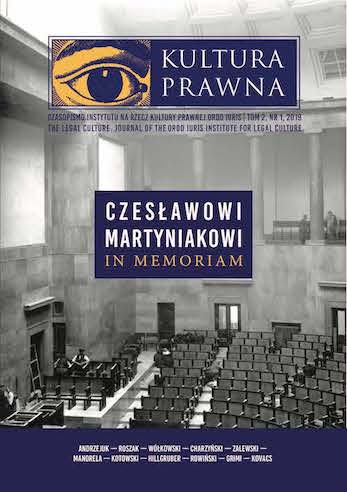Artykuły
Opublikowane 09-11-2020
Słowa kluczowe
- wykładnia prawa,
- aksjologia,
- teoria i filozofia prawa,
- moralność,
- teoria wykładni prawa
Jak cytować
Kotowski, Artur. 2020. “Aksjologiczne Problemy wykładni Prawa”. The Legal Culture 2 (1): 93-110. https://doi.org/10.37873/legal.2019.2.1.56.
Abstrakt
Artykuł omawia kwestię aksjologicznych determinant wykładni prawa na gruncie systemu prawa stanowionego. Autor przedstawia argument, zgodnie z którym paradygmat tzw. wykładni prawa wolnej od aksjologii nie oferuje skutecznej ochrony przed takim sensem prawa, który byłby sprzeczny z podstawowymi zasadami moralnymi. Artykuł koncentruje się na aksjologicznych wskazówkach dla osób dokonujących wykładni prawa, tj. na tym, jak szukać obiektywnego moralnego sensu prawa, oraz na tym, jakie kryteria obiektywnej moralności występują w prawie.
Downloads
Download data is not yet available.
Bibliografia
- Bator A, Sulikowski A, and Pulka Z, ‘Czy koniec teorii prawa?’ [Is This the End of the Theory of Law?] (2011) 312(3337) Acta Universitatis Wratislaviensis. Prawo 13
- Bell J, Cross R, and Engle G, Statutory Interpretation (Butterworths 1995)
- Bennion F, Statutory Interpretation (2nd edn, Butterworths 1992)
- Bix B, ‘Radbruch's Formula and Conceptual Analysis’ (2011) 56 American Journal of Jurisprudence 2011) 45, Minnesota Legal Studies Research Paper No. 12-13 <https://ssrn.com/abstract=2017942> accessed 18 October 2020
- Bunikowski D, Values and Axiology in the European Union Legal System In Context of The European Culture and the Constitution for Europe. Why does the EU need the axiology? <https://www.researchgate.net/publication/303971870> accessed 16 October 2020
- Carnap R, Pisma semantyczne [Semantic Papers] (T. Ciecierski and others trs, Aletheia 2007)
- Cerar M, ‘The Ideology of the Rule of Law’ (2011) 97 ARSP Archiv für Rechts- und Sozialphilosophie / Archives for Philosophy of Law and Social Philosophy
- Dudek M, ‘Instrumentalization [Exploitation] of the Law and Neutralization of Values in Law. Some Reflections after Reading the Draft Amendments of the Special Part of Polish Penal Code of the Sixth Term of Office of the Polish Sejm (2007-2011)’ in Pałecki K (ed), Neutralization of Values in Law (LEX a Wolters Kluwer business 2013)
- Dziedziak W, ‘Axiological Basis for the Application of Law - a Perspective of the Equitable Law’ (2015) 24(2) Studia Iuridica Lubliniensia 49
- Easterbrook FR, ‘The Absence of Method in Statutory Interpretation’ (2017) 84 The University of Chicago Law Review 81, <https://chicagounbound.uchicago.edu/cgi/viewcontent.cgi?article=5986&context=uclrev> accessed 16 October 2020
- Giaro T, ‘Roman Law Always Dies with a Codification’ in Dębiński A and Jońca M (eds), Roman Law and European Legal Culture (Lublin 2008)
- Grabowski A, ‘Clara non sunt interpretanda vs. omnia sunt interpretanda: A Never-ending Controversy in Polish Legal Theory?’ (2015) 27 Revus [Online] <http://revus.revues.org/3326>, DOI: <https://doi.org/10.4000/revus.3326> accessed 18 October 2020
- Grzybowski T, Zirk-Sadowski M, Argumentum a Contrario (2017) 72(11) Państwo i Prawo
- Hart HLA, Pojęcie prawa [The Concept of Law] (J. Woleński tr, Wydawnictwo Naukowe PWN 1998)
- Heideman RD, ‘Legalizing Hate: The Significance of the Nuremberg Laws and the Post-War Nuremberg Trials’ (2017) 39(5) Loyola of Los Angeles International and Comparative Law Review <http://digitalcommons.lmu.edu/cgi/viewcontent.cgi?article=1729&context=ilr> accessed 18 October 2020
- Neubert A and Shreve GM, Translation as Text (The Kent State University Press 1992)
- Rabault H, Granice wykładni sędziowskiej [Borders of Judicial Interpretation] (B Janicka tr, Scholar 1997)
- Radbruch G, Ustawa i Prawo (Zajadło J tr) [2002] Ius et Lex 157 <https://www.law.uj.edu.pl/users/kprz/docs/radbruch%20ustawa_i_prawo.pdf> accessed 18 October 2020
- Stelmach J, Pozytywistyczne mity metody prawniczej [Positivist Myths of the Legal Method] (2012) 3(11) Forum Prawnicze
- Stychin CF, Mulcahy L, Legal Methods and Systems (4th edn, Sweet & Maxwell 2010)
- Tebbit M, Philosophy of Law. An Introduction (3rd edn, Routledge 2017)
- Varga C, The Paradigms of Legal Thinking (Szent Istvan Tarsulat 2012)
- Veitch S, Moral Conflict and Legal Reasoning (Hart Publishing 1999)
- Vencatasamy L, The Common Law and Civil Law Traditions accessed 16 October 2020
- Waśkowski E, Teoria wykładni prawa cywilnego. Metodologja dogmatyki cywilistycznej w zarysie [Theory of Interpretation of the Civil Law. Civil Law Methodology – an Outline] (Izba Adwokacka w Warszawie 1936)
- Zeppos NS, The Use of Authority in Statutory Interpretation: An Empirical Analysis (1992) 70(5) Texas Law Review






